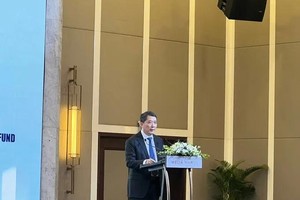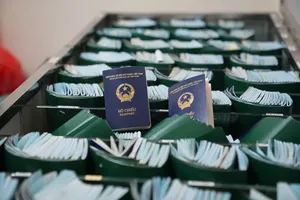
Specifically, after a long period of offering bills with a term of 28 days, the SBV on June 24 and June 21 reduced the bill term to 14 days, while keeping the interest rate unchanged at 4.25 percent per year.
The SBV’s move was made as the interbank rates for terms less than one month have dropped sharply and the US dollar has still significantly appreciated against the Vietnamese dong.
According to the SBV’s latest data, interbank interest rates at overnight terms on June 20 decreased to 3.46 percent per year from 4.42 percent per year in the previous year. Interest rates for short terms, such as one week and two weeks, also dropped by 0.77 percentage points and 0.04 percentage points, respectively.
On the foreign exchange market, during the week from June 17 to June 21, the SBV’s central exchange rate was adjusted up by VND7 compared to the previous week to VND24,256 per dollar. Commercial banks listed the dollar selling price close to the prescribed cap of VND25,468 per dollar.
With the SBV’s reduction of bill term, interbank interest rates are expected to increase again. In fact, after the SBV’s move, the volume of winning bills on June 21 and June 24 increased to VND8.9 trillion and VND10.15 trillion, respectively, the highest levels since the end of May.
Previously, after more than four months of pause, the SBV resumed bill offering activities from March 11. The restarting of the SBV’s bill offering activities aims to absorb excess liquidity in the system, which has helped raise interest rates in the interbank market and indirectly depreciate the US dollar against the Vietnamese dong.
The SBV has continuously maintained the bill issuance over the past three months as the exchange rate pressure has not shown many signs of cooling down after the US Federal Reserve (Fed) is still quite cautious in reducing interest rates.
In addition, the SBV also continuously adjusted the bill winning interest rate to create attractiveness for the channel to absorb liquidity and increased interest rates on the open market operation (OMO) to 4.5 percent per year.
According to analysts, the SBV’s move aims to establish a higher interbank interest rate, which will help reduce pressure on the exchange rate and the nation’s foreign exchange reserves. It is estimated the SBV has so far sold some US$4 billion for commercial banks to stabilize the forex market.
























